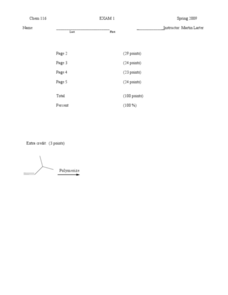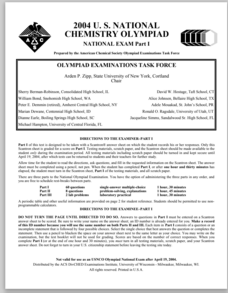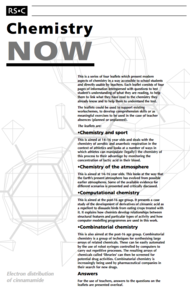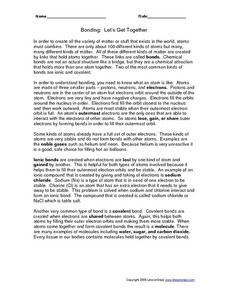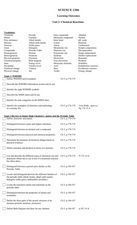Curated OER
Interpreting Chemical Formulas
In this chemical formulas worksheet, students determine the number and type of each atom and the total number of atoms for the given formulas. Students complete 10 problems.
Curated OER
What Happens When Chemicals are Put Together?
In this ionic compounds worksheet, high schoolers complete two tables with the chemical formulas given the cations and anions that bond.
Biology Junction
Chemistry Crossword
Scholars complete a crossword puzzle in this chemistry worksheet with 20 questions about chemistry concepts like atoms and chemical reactions.
Curated OER
Chemistry of Life Study Guide
Biology learners should understand a few chemistry basics. Here is a worksheet that introduces them to the concepts of chemical reactions, molecular bonding, and the unique combination of properties that make water vital to life....
Curated OER
Honors Chemistry, Organic Chemistry
Looking for a versatile worksheet on organic chemistry? If so, you might consider this resource. This resource asks learners to identify organic molecules, match terms with their definitions, determine bond angles and hybridization of...
Curated OER
Amazing Carbon
Explore carbon and bonding with this learning exercise. First, class members read a short excerpt about carbon and its characteristics. In response to the reading, they draw an electron dot diagram of carbon as well as diagrams of...
National Institute of Open Schooling
Coordination Compounds
Cyanide, a coordination compound, is used in the extraction of gold and silver. Part 24 in the series of 36 delves into the world of coordination compounds. Classes learn, through readings, discussions, and answering questions, how to...
Curated OER
Chemistry 116 Exam 1, Spring 2009
This five-page exam was designed for a biochemistry and organic chemistry course. It covers the molecular geometry and properties of organic comounds. Test takers identify compounds, functional groups, and isomers. They draw Lewis...
National Institute of Open Schooling
Aldehydes, Ketones and Carboxylic Acids
Although their name makes them sound dangerous or toxic, carboxylic acids are found throughout nature in things such as citric acid, vinegar, and even in your DNA. Through detailed readings, discussions, and answering questions...
Curated OER
2004 U.S. National Chemistry Olympiad Part I
In this chemistry worksheet, test takers answer 60 multiple choice questions on topics related to chemistry from balancing equations to calculating moles and molecules of compounds. They name formulas, they convert, they solve problems...
Royal Society of Chemistry
Computational Chemistry—Chemistry Now
Can some plants make their own animal repellents? Science sleuths examine the properties of cinnamamide in pear trees using an case study about computational chemistry. The resource discusses how vital computers are to research, how...
Curated OER
Sample Midyear Examination (Chemistry and Biology)
A 12-page midterm exam sample can be given to young scientists in preparation for an exam. This particular installment is geared toward a class that delves into both ecology and chemistry concepts. There is no way to separate the 50...
Curated OER
IB Chemistry Practice Test
In this chemistry review worksheet, students practice using Avogadro's number, calculating number of moles, and using the gas laws. This worksheet has 39 multiple choice questions.
Curated OER
How Do Atoms Stick Together?
In this chemical bonding activity, learners answer 10 questions about ionic bonding, covalent bonding, metallic bonding, Lewis structures, and intermolecular forces.
Curated OER
Bonding: Let's Get Together
In this atom instructional activity, students read 5 paragraphs about ionic bonds. Students answer 2 true/false questions, 4 fill in the blank, 3 multiple choice, and 1 short answer question.
Pingry School
Comparing Activities of Selected Metals
Don't overreact! A simple experiment demonstrates chemical reactions as scholars mix chemical solutions and metals in a large well plate. They note all changes to the metals, solutions, precipitate, colors, and more. A full data table...
It's About Time
Organic Substances
Host an exciting lab in which learners burn fruit rinds to better understand hydrocarbons. A reading passage and analysis questions wrap up the lesson.
National Institute of Open Schooling
p-Block Elements and Their Compounds – II
Ozone, made of three bonded oxygen atoms, is found 15-30 km above Earth, has a strong smell, is blue, and blocks sunlight from hitting the surface of Earth. The 22nd lesson in a series of 36 specifically focuses on the important elements...
Curated OER
Learning Outcomes
In this science worksheet, learners explore the learning outcomes for a unit on chemical reactions. Students define 60 vocabulary words and answer a list of questions for each topic.
Curated OER
Matter and Chemical Bonding
For this chemical bonding worksheet, students read about the invisible killer, dihydrogen monoxide. Students read about the products it is used in and the problems it causes to the environment. Then students complete 19 short answer...
Curated OER
Classifying Chemical Reactions
In this chemical reactions learning exercise, students learn about the 5 types of chemical reactions as well as endothermic and exothermic reactions. Students are given 5 equations to balance and they identify the type of reaction for...
Curated OER
Classifying Chemical Reactions
In this chemical reactions worksheet, learners follow a flow chart to determine what type of reaction is occurring. Students then classify reactions and balance the equations. This worksheet has 2 short answer and 10 fill in the blank.
Curated OER
Ionic and Covalent Bonds
Ionic and covalent bonds are the focus of this chemistry activity, which provides learners with eighteen key terms to use in a fill-in-the-blank activity. Additionally, students are prompted to write the number of atoms in four given...
Curated OER
Elements and Bonding Worksheet
In this elements and bonding worksheet, students classify given elements, they identify valence electrons in atoms, they explain the reactivity of elements, and they explain why certain atoms gain electrons while others lose electrons.









